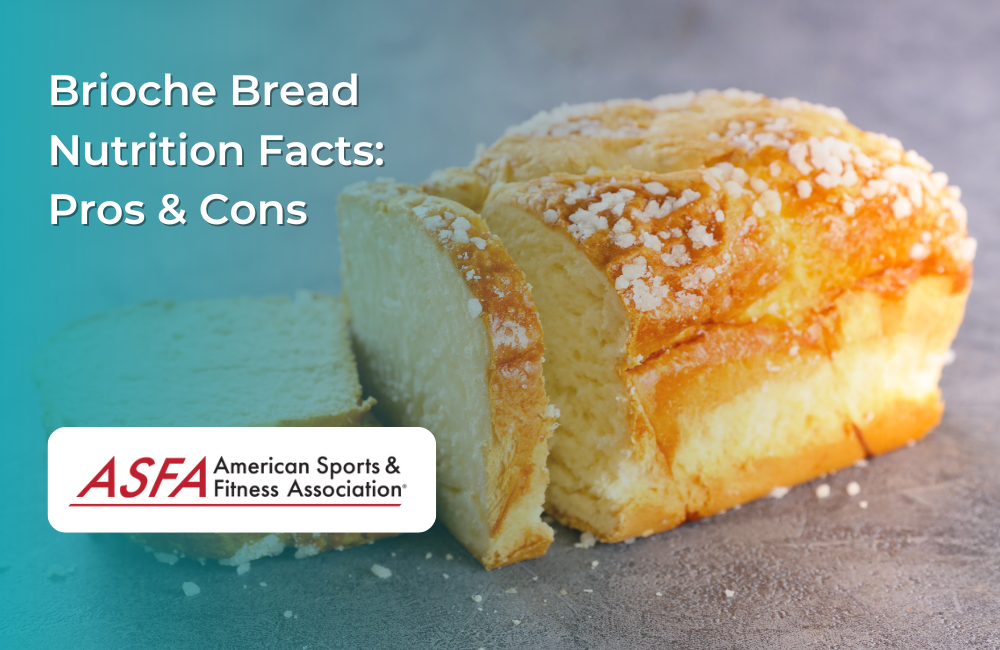Brioche is a soft, buttery, and slightly sweet bread made with flour, eggs, butter, milk, sugar, and yeast. It has a rich texture and flavor, making it a popular choice for sandwiches, burgers, and pastries. While brioche provides some essential nutrients, it is also high in refined carbohydrates, sugar, and fat. Understanding the pros and cons of brioche bread helps in making informed dietary choices.
Brioche Bread Nutrition Facts: Pros and Cons of Eating It
Brioche is rich in flavor and texture, making it a versatile option for both sweet and savory dishes. It contains eggs, butter, and milk, which provide small amounts of protein, calcium, and essential vitamins like B12. Additionally, brioche is an excellent choice for making bread pudding, a versatile dish that can be both sweet and savory, making use of slightly stale brioche.
Compared to standard white bread, brioche has a softer, fluffier texture, making it more satisfying and indulgent. Some versions of brioche made with whole wheat flour offer more fiber and nutrients, though most are made with refined flour.
Since brioche contains eggs and dairy, it has a higher fat content, which may contribute to better satiety and a more satisfying eating experience compared to plain white bread.
Nutritional Value of Brioche Bread
Brioche bread is a delightful blend of carbohydrates, protein, and fat, making it a rich and satisfying option. A typical 38-gram serving of brioche bread packs about 110 calories, 4 grams of protein, 1.4 grams of fat, and 20 grams of carbohydrates. This serving size also provides essential vitamins and minerals, including thiamin, niacin, riboflavin, iron, and folic acid. While the carbohydrate content is relatively high, with 20 grams per serving, it includes 3 grams of sugar and 1 gram of fiber. The fat content is modest at 1.5 grams per serving, and the protein content is moderate, offering 4 grams per serving. This nutritional profile makes brioche a versatile addition to a balanced and varied diet, though it should be enjoyed in moderation due to its refined flour and sugar content.
Health Benefits of Brioche Bread
When incorporated into a healthy and balanced diet, brioche bread can offer several health benefits. The carbohydrates in brioche provide a quick source of energy, which can be particularly beneficial for active individuals. The iron and folic acid content in brioche supports the production of red blood cells, contributing to overall vitality. Additionally, the presence of thiamin, niacin, and riboflavin helps meet daily nutrient needs, supporting various bodily functions. However, it’s important to note that brioche contains wheat flour, making it unsuitable for those with gluten intolerance or celiac disease. For those who can consume wheat, brioche can be a delightful and nutritious part of their diet, provided it is eaten in moderation.
Cons of Eating Brioche Bread
Brioche is high in refined carbohydrates, which can cause blood sugar spikes and provide little fiber compared to whole grain bread. It also contains added sugar, making it a higher-calorie option than standard bread.
Due to its butter and egg content, brioche has more saturated fat, which should be consumed in moderation, especially for individuals monitoring cholesterol or heart health.
Store-bought or processed brioche often contains preservatives and artificial ingredients, reducing its nutritional value. Making homemade brioche or choosing high-quality bakery versions ensures fewer additives. Individuals following strict vegan diets cannot consume bread made with dairy or eggs, making alternatives like brown rice bread a popular choice due to its health benefits.
Comparison to Other Types of Bread
When comparing brioche to other types of bread, it’s clear that each has its unique nutritional profile and health benefits. Whole wheat bread, for instance, is a healthier option than brioche due to its higher fiber and nutrient content, which supports digestive health and provides sustained energy. Sourdough bread, known for its lower glycemic index, is a better choice for individuals concerned about blood sugar spikes. Rye bread offers a robust flavor and is higher in fiber and nutrients compared to brioche, making it a heartier and more nutritious option. For those with gluten intolerance or celiac disease, gluten-free bread is a suitable alternative, though it may not offer the same nutritional benefits as whole grain bread. Ultimately, the best choice of bread depends on individual dietary needs and preferences, with whole grain options generally being the most beneficial for overall health.
Conclusion
Brioche bread is a rich, indulgent bread that provides small amounts of protein, vitamins, and minerals, but it is also high in refined carbs, sugar, and fat. While it can be enjoyed as a delicious treat, it should be consumed in moderation, with healthier alternatives such as whole wheat brioche or fiber-rich breads being better for daily consumption.
FAQs
Is brioche bread healthier than white bread?
When you eat bread like brioche, you consume more fat and sugar, making it higher in calories than regular white bread, but it is also more flavorful and satisfying.
Can brioche be part of a healthy diet?
Yes, but in moderation. Pairing it with lean proteins and fiber-rich foods can help balance its high carbohydrate and fat content.
Incorporating whole grains into your diet, such as whole grain bread, can provide additional health benefits like improved digestion and reduced risk of heart disease.
Is brioche good for weight loss or does it cause blood sugar spikes?
Brioche is calorie-dense due to added butter and sugar, making it less ideal for weight loss compared to whole-grain bread.
Does brioche contain protein and is it suitable for gluten intolerance?
Yes, brioche contains some protein from eggs and milk, but it is not a significant protein source compared to other breads.
What are healthier alternatives to brioche, such as whole grain bread?
Whole wheat brioche, sourdough, or whole grain bread are better options for those looking for more fiber and lower sugar content while still enjoying a soft texture.





